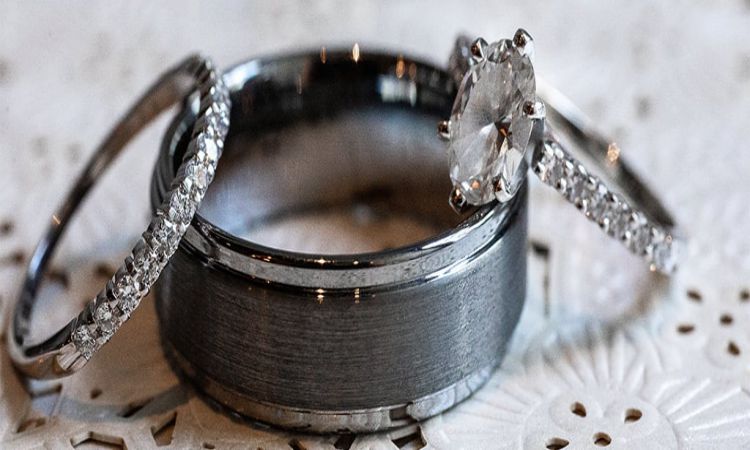When it comes to selecting a wedding ring, the material is a crucial factor to consider. Two of the most popular materials for wedding bands are tungsten and titanium. Both materials have distinct properties, benefits, and drawbacks that make them suitable for different types of wearers. In this blog, we will compare tungsten and titanium, analyze their properties, benefits, and drawbacks, and ultimately determine which material is better for wedding rings.

Tungsten
Tungsten is a durable and scratch-resistant metal that is often used in industrial settings. It has a dark, gunmetal-grey hue and a lustrous finish that gives it a sophisticated and modern look. One of the main benefits of tungsten is its hardness – it is one of the strongest materials on earth and is four times harder than titanium. This means that tungsten rings are highly resistant to scratches, dents, and corrosion, making them an ideal choice for those who lead an active lifestyle.
Another advantage of tungsten is its weight. Tungsten is a dense metal that feels substantial on the finger, which some wearers find appealing. Additionally, tungsten does not tarnish, oxidize, or fade, ensuring that your ring retains its original shine and beauty.
However, there are also some drawbacks to tungsten. The main one is its brittleness. Tungsten is a rigid metal that cannot be resized, making it challenging to replace or adjust the ring. Moreover, while tungsten is highly scratch-resistant, it is not entirely scratch-proof. It can still crack or shatter under extreme pressure, so wearers must handle it with care.
6al4v Titanium
6al4v titanium is a hypoallergenic metal that is lightweight, durable, and corrosion-resistant. It has a shiny silver-white color and a brushed or polished finish that gives it a sleek and contemporary look. Unlike tungsten, titanium is a malleable metal that can be resized, repaired, and adjusted without difficulty, making it an excellent choice for those who need flexibility in their ring.
One of the benefits of titanium is its biocompatibility. It is a non-toxic, non-reactive metal that does not cause skin irritation or allergic reactions. This is especially important for wearers with sensitive skin who may have an adverse reaction to other metals.
Another advantage of titanium is its lightness. Titanium is one of the lightest metals used in jewelry, making it a comfortable option for those who prefer a lightweight ring. Additionally, titanium retains its color and finish over time, making it a low-maintenance metal.
However, there are also some drawbacks to titanium. It is not as hard as tungsten, meaning that it can scratch more easily over time. Moreover, titanium is not entirely scratch-resistant and can show signs of wear and tear over time.
Which is better for wedding rings?
After analyzing the properties, benefits, and drawbacks of tungsten and titanium, it's clear that both metals have unique advantages and disadvantages that make them ideal for different types of wearers.
For those who prioritize durability and scratch-resistance, tungsten is an excellent choice. Its hardness and resistance to scratches, dents, and corrosion make it a long-lasting and practical option for those with an active lifestyle.
On the other hand, titanium is perfect for those who need a lightweight, hypoallergenic, and flexible ring. Its biocompatibility, malleability, and low-maintenance features make it ideal for wearers with sensitive skin and those who need to resize or adjust their ring.
Ultimately, the best material for wedding rings depends on the wearer's preferences and needs. Both tungsten and titanium have unique features that make them valuable and practical for different types of wearers. Make sure to consider your lifestyle, skin type, and ring needs before selecting your wedding band material.